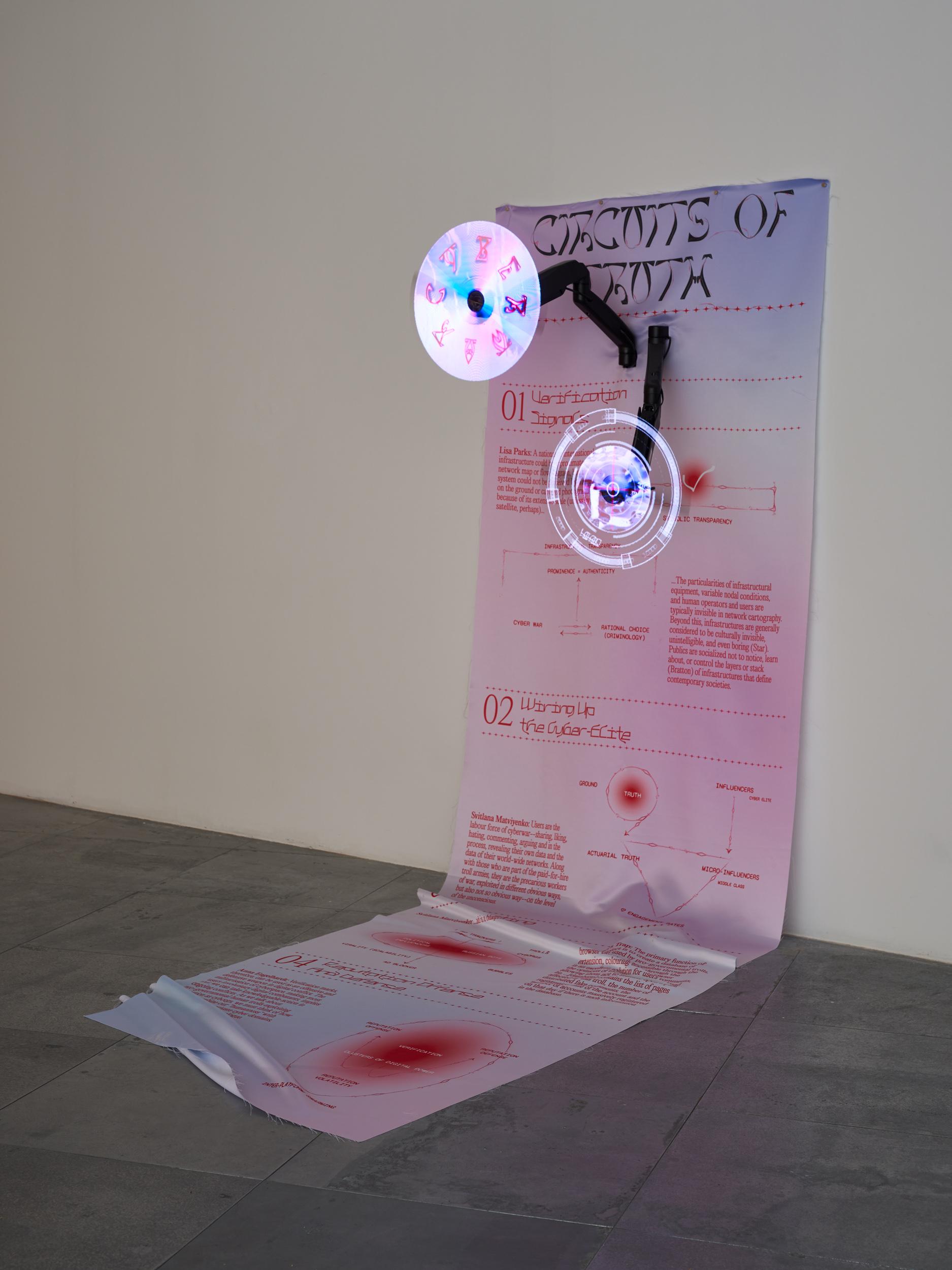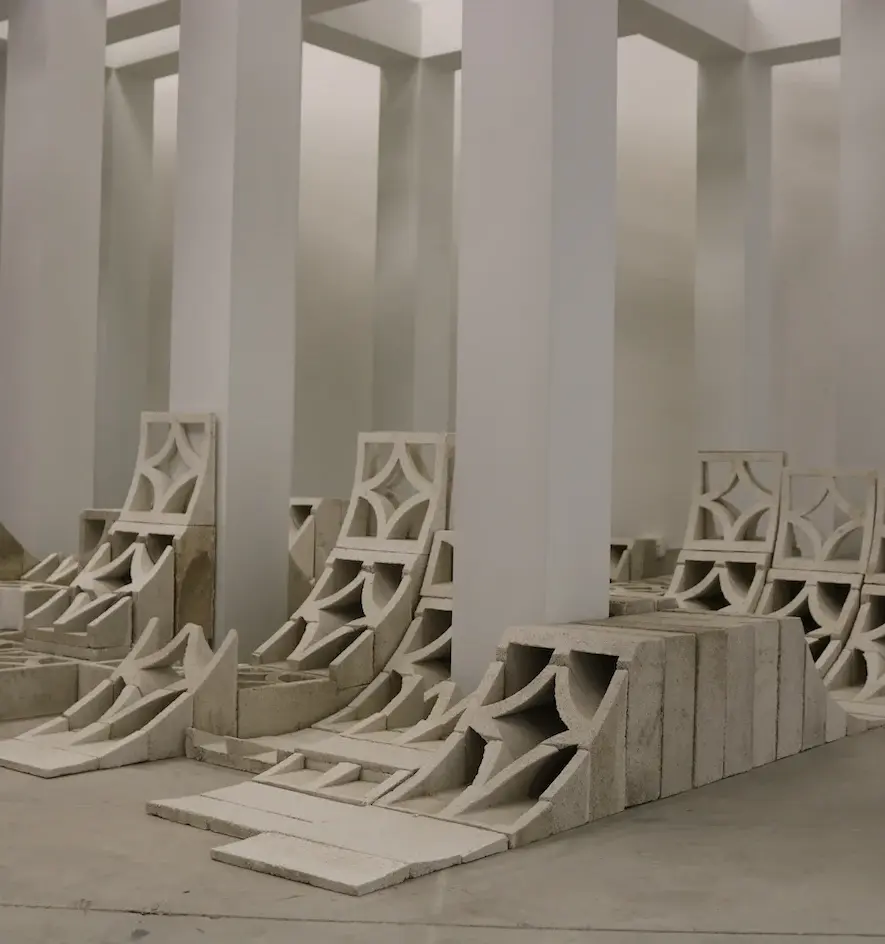
exhibitionAnna Engelhardt & Bahar Noorizadeh Curated by Reem ShadidThe Green Room15.10—11.11.202156 Conduit Street
11:00am—6:00pm56 Conduit Street
The Green Room is an exhibition and public engagement project curated by Reem Shadid, developed in part during her residency at V.O Curations. The project invites artists, Anna Engelhardt and Bahar Noorizadeh, to share questions and insights around the deep interdependence of the digital world with our material one, namely by exploring digital platforms, websites, infrastructures and networks.
Through their respective (art)works - Circuits of Truths (C.T) by Engelhardt and Weird Economies (W.E), a project initiated by Noorizadeh - this presentation will consider the back-end infrastructure of digital platforms as a set of ambiguous relations rather than cables, wires, and servers. The exhibition cautiously approaches how we relate to and navigate the cyber domain as space. Drawing from the spectrum that ranges from public to private physical spaces.
The Green Room presents cyberspace as a part of such a continuum. The exhibition unleashes the content, architecture, networks, and infrastructures of the two works through an online and physical space. It seeks to propose how to think through, create and re-appropriate other modes of relating, governance, knowledge, verification and ownership through these tools.
Conceived as a hybrid back-end space, C.T and W.E come together through spatial interventions as well as a public programme, comprising conversations and workshops. W.E and C.T meet at three central nodes that will guide spatial and conceptual engagement: ownership, verification and surveillance.
As an online platform and think-tank prioritizing artistic strategies that trace economic imaginaries despite current financial arrangements and systems, Weird Economies (www.weirdeconomies.org) self-reflectively questions and deliberates the platform’s code of ethics, and mode of ownership and governance. It also aims to recuperate the increasingly extractive, privatized and hegemonized condition of a digital platform in order to create a common one that is able to scale up and down effectively when needed. During the exhibition period, W.E gathers ‘stakeholders’ to share and discuss values, goals and strategies to create a common space for the research and practice of alternative economies. At a time when art institutions are increasingly relying on digital content, how can we understand ownership of this content and its circulation? What forms of collective participation, decision-making, autonomy, accountability and cooperation among members working across geographies might mean today or what could it look like? What can this hybridity of our being and relations open up to in building the tools, networks, economies and infrastructures that we need.
Through Circuits of Truth, Engelhardt scrutinises the notions of authenticity and fake, foundational for our digital realm. The website (https://machinic.info) offers insight into and tools to reconsider our relationship to the complex paradoxes of truth production. Introducing users to the various steps the content goes through to become ‘true' reveals the digital assembly line that manufactures authenticity. Engelhardt allows choosing the level and mode of engagement with the infrastructure
she investigates. The networks she highlights span from tracking devices that spread fake news to cyber weapons that engage verified accounts. Through her intervention in The Green Room, she forces us to confront our own digital autonomy or lack thereof. What is the role of seemingly menial visual signifiers like blue verification ticks and authentication requests on the internet? How can we exit the closed verification bubbles reliant on binaries of ‘true' and ‘fake'? Where do we start looking to reverse engineer these various mechanisms of “truth" production?
The public programme for The Green Room looks at broader questions of digital infrastructures to address the central nodes of the project. Interviewed by Engelhardt, Emily Rosamond, lecturer in Visual Cultures at Goldsmiths University, will talk about reputational warfare and algorithmic rating. Jared Davis, Associate Editor of AQNB and co-host of the editorial platform’s Artist Statement podcast, will convene a workshop on digital ownership and cooperation. Finally, W.E will host a closed assembly that will draw and connect desired, practical and imagined values, goals and strategies to creating a digital commons based on shared interest in alternative economies; the results of this mapping will be installed in space following the workshop.
The Green Room scratches at questions around the relationship between digital infrastructures and material worlds, understanding it as a continuum from one realm to another rather than their current common binary dispossession. What can this understanding support and what does it reveal? In what has become an inevitable search, we seek to locate public space in relation to private digital worlds and vice versa and are left constantly with the question; What can these technologies open up anew in our current conditions, be it as a new language, constellation of relations, or an opportunity to explore and instrumentalize that which lies within the gaps and leaks of these intersecting worlds.
Text by Louise d'Arblay

Anna Engelhardt is a Russian media artist and writer whose research-based practice explores post Soviet infrastructures as a form of politics. Comprising texts, videos, websites, and digital platforms, her investigations take on multiple forms of media and distribution as they develop over time. Her project Circuits of Truth (2021) explores cyberwar from the perspective of user verification, and was commissioned by GARAGE Museum of Contemporary Art, Moscow. Produced using deepfake technology, her video essay Adversarial Infrastructure (2020) investigates the colonial violence of the Russian Crimean Bridge, and was shown at Ars Electronica, 67th International Short Film Festival Oberhausen, Vancouver International Film Festival and Kyiv Biennial. Anna's writings have been published in Mute Magazine, Strelka Magazine, Journal of Visual Culture, and the European Review.
Bahar Noorizadeh is a filmmaker, writer, and platform designer. She works on the reformulation of hegemonic time narratives as they collapse in the face of speculation: philosophical, financial, legal, futural, etc. Noorizadeh is the founder of Weird Economies, an online art platform that traces economic imaginaries extraordinary to financial arrangements of our time. Her work has appeared at the German Pavilion, Venice Architecture Biennial 2021, Tate Modern Artists’ Cinema Program, Transmediale Festival, DIS Art platform, Berlinale Forum Expanded, and Geneva Biennale of Moving Images among others. She is pursuing her work as a PhD candidate in Art at Goldsmiths, University of London where she holds a SSHRC Doctoral Fellowship.
Reem Shadid is a curator, researcher and cultural organiser who works on the emancipatory possibilities within artistic practice, exploring the ways it intersects with ecological, political and socio-economic forms. She is the producer and host of Radio Alhara’s show Listening with Reem Shadid; monthly listening sessions with artists, researchers and curators working at the intersection of sonic, visual and literary productions. She is also a contributing editor at Infrasonica, a digital platform of non-western cultures. Previously, she was the Deputy Director of Sharjah Art Foundation, where she served in various capacities, focusing mainly on organising and producing the Sharjah Biennial between 2006-2020.
Related
 artistReem Shadid
artistReem Shadid